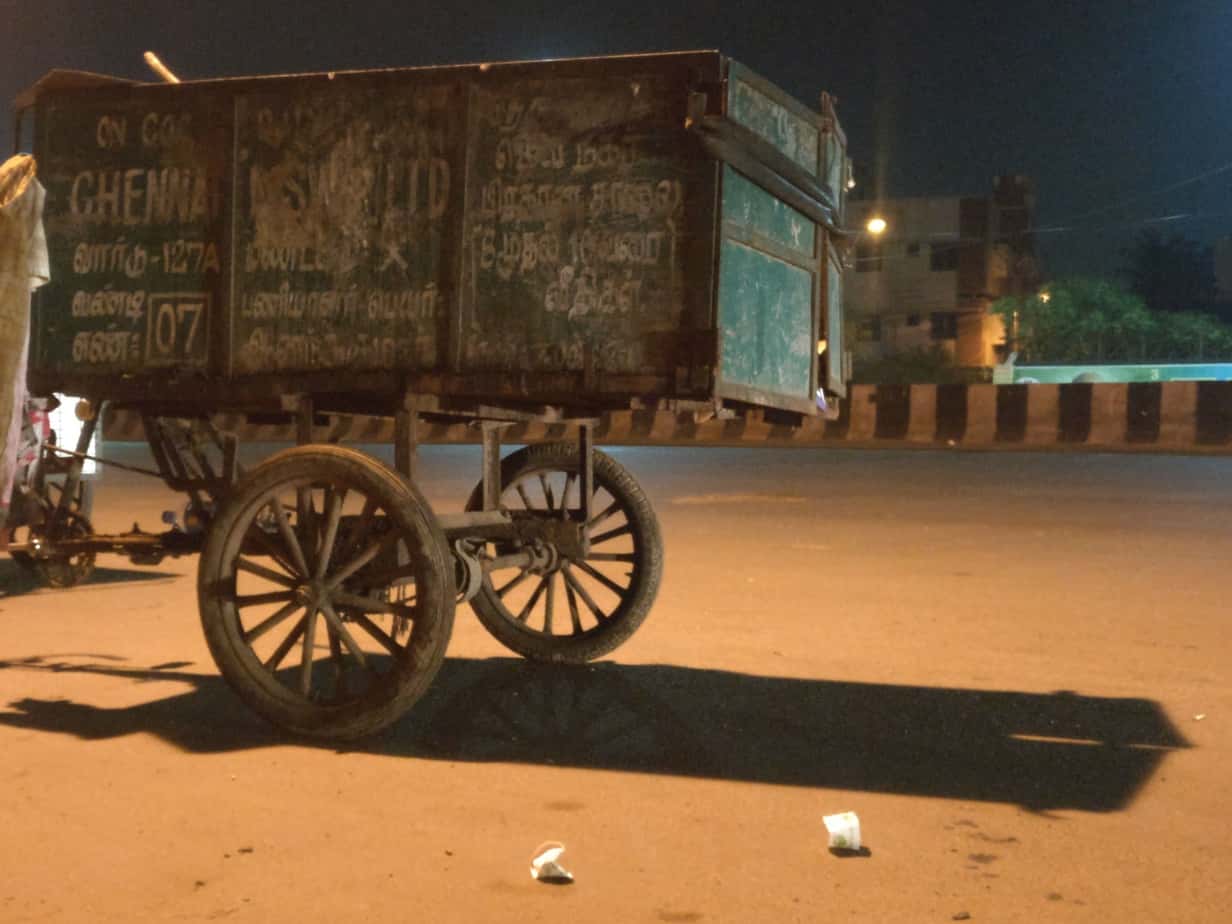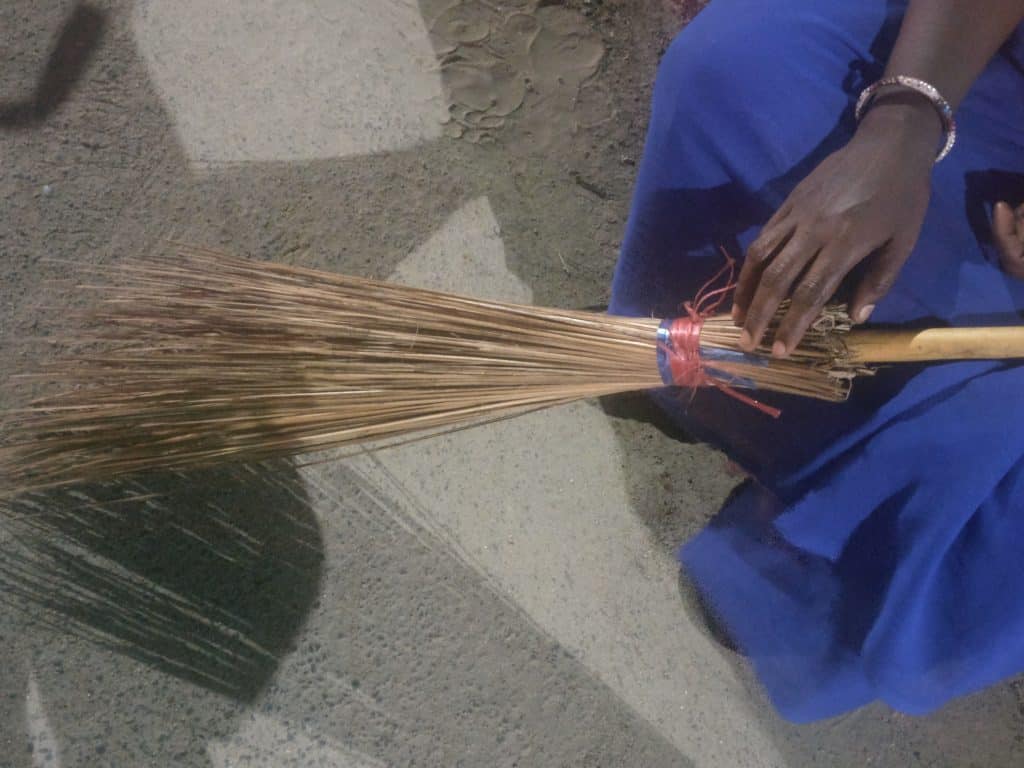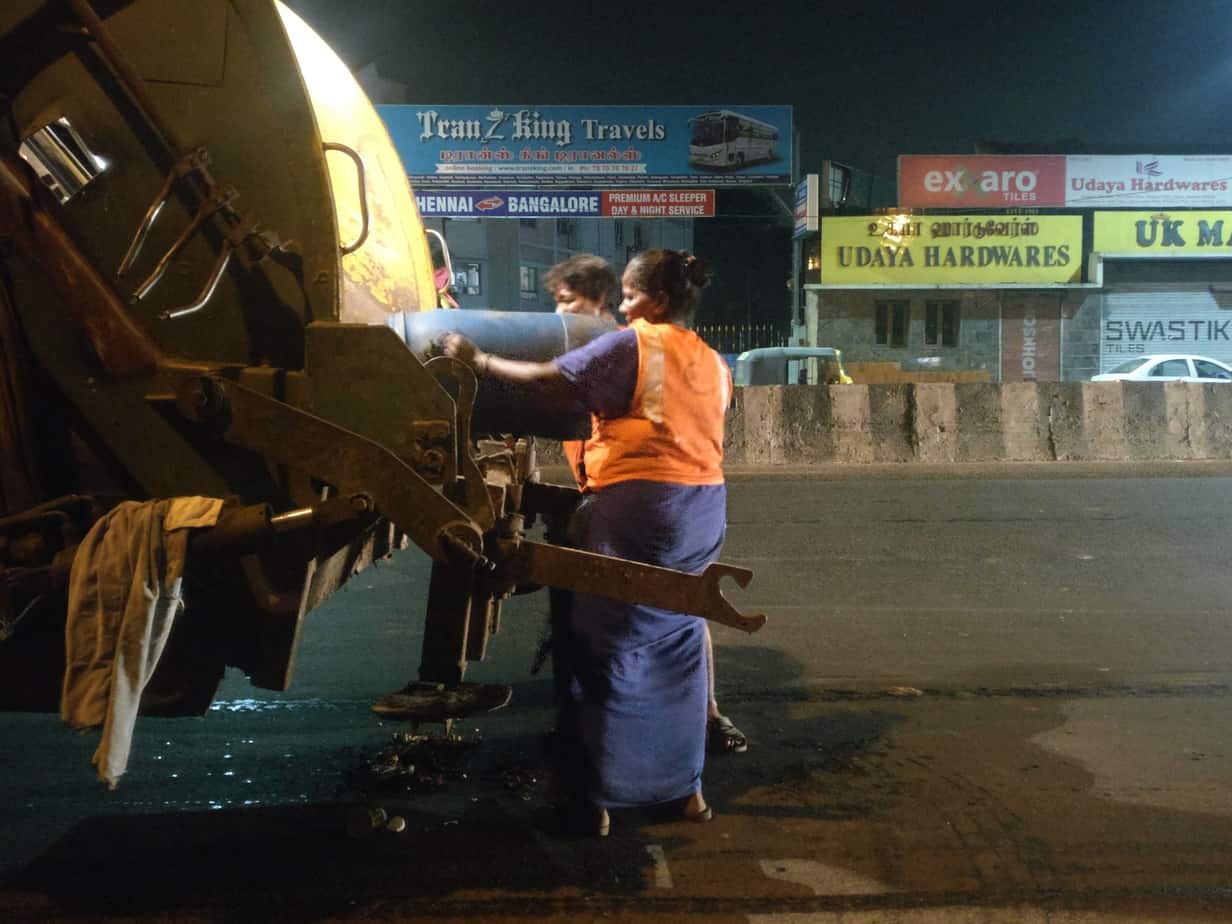The steady, low hum of buses leaving the city punctuates the night at Koyambedu, a commercial hub in Chennai. A few shops remain open for the odd patron while others are firmly shut. Under the golden yellow of the street lights, a rhythmic swoosh of bamboo against tar grows in the dark. Three women, bent at work, are leaving a pristine path in their wake, a trail they have cleaned for the last seven years. Armed with a rickety tricycle, an old aluminium basket, two brooms and reflector vests, this motley crew makes singara Chennai.
The women work meticulously, one pushes the tricycle, while the others use the bamboo brooms, short and long, to sweep up the dust and litter off the road. None are young and each tells her gritty story as they toil.
“I did not have to work until a few years ago,” said Shanthi, 49, whose husband, a mason, went into debt paying for their daughter’s wedding. He fell ill, and soon after Shanthi had to seek work. Life took an even grimmer turn after their daughter’s husband committed suicide within six months of marriage. With a daughter and grandson now living under same roof, she took up the job of a nightly street sweeper under a private contractor in the city.
Sasikala, 55, ran a tiffin stall out of her home. When business shut down due to poor sales and rising costs, she turned to the first job that came her way.
Devi, 32, quit work at a steel factory because the unsafe working conditions brought with it many respiratory ailments. Now, as city cleaners — a cog in the poorly managed solid waste ecosystem – their woes haven’t vanished—they just are different.
The sanitation workers get paid Rs 6000 per month after deductions which is well below the prescribed minimum wage of Rs 13000 as per the 2017 notification issued by the Tamil Nadu state government. While the corporation of Chennai lists 11,184 workers on its payroll, the private contractor did not disclose a number when contacted. With gaps in data comes a lack of accountability.
“The problems faced by these workers are plenty. There is no job security.” says Srinivasalu, a leader in the Red Flag Union working for the welfare of the sanitation workers of the city. “They could get fired any time. If someone is unable to come to work due to illness, there is no guarantee they will have a job. All our protests and pleas for better working conditions and wages have fallen on deaf ears.”
The facilities available on the job are abysmal, too. “We don’t have access to any toilets while we work. The public toilets are too far away or too dirty to use,” says Devi. “We just don’t have a choice. Sometimes we have to just use a secluded spot on the road but we feel bad as we are the ones cleaning the streets.”
Sanitation workers in the city have a high risk of contracting various communicable diseases due to handling of waste, most of the time with their bare hands. A study conducted by Roopa Srinivasan found a high instance of respiratory ailments among waste workers in the city vis-a-vis those engaged in other occupations. The three women says they have been fortunate not to have suffered any serious ailments as a result of their jobs. “We get mandatory injections once a year to prevent any infections. The contractor takes care of that expense,” says Sasikala.
The three women travel from their homes in Pulianthope to their work by bus, with fares alone eating into 35% of the daily earnings. “It takes us an hour and a half to get here from home and we have to pay the bus fare,” says Sasikala. “We tried to talk to the contractor to provide us an allowance for transport and tea but the negotiations with the union have been going on for years with no result.”
Snapshots of the night
Shanthi, Devi and Sasikala are perhaps the only women in the area who are out past midnight. They get friendly waves from some of the men they pass by and exchange pleasantries. “They are just looking out for us. We know everyone in this area as they see us work every day”.
The women forge on as the tricycle brims with the city’s discards. They pause for a break and flag down a tea-seller. The three take refuge under the awning in front of a restaurant to relax. This is one of the two tea breaks they take on their 8-hour shifts. Before walking away, the tea-seller makes a case for the workers. “These women are familiar faces to all of us. They are here every night without fail, doing their jobs but there is no one who cares about them or fights for them. I hope something good happens to them.”
They move the tricycle towards bins on the side of street to unload the waste. Devi, the taller of the three workers, scoops the mixture of food, plastic and dust from the street in the aluminium basket and transfers it in swift motions as the others watch on. Her pace slows after the seventh time of unloading waste. It takes twenty minutes and countless scoops for the tricycle to be emptied.

The women gather three full loads of garbage in the tricycle over the course of the night . Pic: Aruna Natarajan
It takes the women close to three hours to fill the tricycle once again. They make a quick pit stop at a hotel that is still open. The proprietor brings bins of waste to the women who flag down a passing garbage truck to dump them. After bringing out his garbage, the hotel worker gives the women a tray stacked with snacks that went unsold at his hotel that night. The women divide the different kinds of vadas between them, packing them in plastic bags that they hand by the side of the tricycle. Nothing is said of this exchange.
An uncertain future
Between bites of the cold leftovers the women discuss their employer’s decision to downsize in the coming months. With the termination of the contract with the city, to manage waste in three zones, the private contractor is set to let go of majority of the workforce, mostly women, all over the age of 50.
“I will not have a job in three months, despite working here for seven years. I do not know what to do to support my family at this age,” says Shanti. While she deftly cleans paths for the city’s residents, she speaks of her struggle to help her daughter navigate life in recent years. “My daughter has been unable to stick to a job. She is still upset about her husband, though it has been five years since his passing. She breaks down often and is inconsolable. My grandson is also upset at seeing his mother. I don’t know how to make her feel better.”
As hours pass, the tricycle can barely hold the litter from the day. The women gather three such loads each day so the city can wake up to palatable surroundings. They pass another row of shops, turning left, onto another winding road. Greeted by more litter, the seemingly endless swoosh of the broom resumes.
(We wish to thank the National Geographic Society and the Out of Eden Walk, whose 2018 Journalism Workshop supported the creation of this project.)


Yes, indeed. The heroes and heroines of the Municipal bodies all over the country are the sweepers who work against overwhelming odds in trying to keep their cities and towns clean and hygienic to the best extent possible. Hats off to all of them for their work on 24x7x52 basis throughout the year ! All citizens should take up their cause for making their work safe, easy and hygienic by seeking their employing municipal bodies to provide them with gloves, nose guards, aprons, efficient tools, barrows, periodical medical checkups, incentives for source segregation, segregated dumping/clearance and a share in the disposal of wastes to recycling agencies. From a traditionally shunned profession reserved for a hereditary part of the population, the work should be honoured for their global environmental contribution and helped to bridge the social divide to become respected part of our society.
Thanks to these ‘highway queens’ Chennai is very much cleaner than what it was years back. This is in stark contrast to streets of Bengaluru That was in 70s, 80s and 90s. Latest trend in Bengaluru is to carry garbage while going out it may be to office, shopping or even while carrying items of sanctity or offerings to temple. Such people spread infection and should be heavily fined and kept in custody for a while. I have seen this new trend in Bengaluru and they are behind eyesore dumping sites of garbage on roads etc.